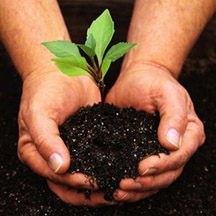
There have been meat-eaters and there also have been those who vouch for vegetarianism. While the latter’s reasons may be religious, to ward off diseases or on humanitarian grounds, the former have tempted the latter with what they could be missing out on by depriving the latter’s taste-buds!
While it is futile convincing anyone to forsake their ideas, the world will be a better place for the future generations, if we adopt a holistic approach.
Saving the environment does not indicate that one should forsake meat alone; it means forsaking greed. Our eco-system is a well-balanced one, with the availability for every being’s needs, but not for every being’s greed! When we break this fragile eco-system thereby exploiting it, we are creating nothing but irreparable damage. If only the world’s builders mend their vandalizing ways, each time trees are cut down to make way for skyscrapers and hotels; if only seafarers are prudent to avoid oil-spillage; if only scientists realize the wreckage the discovery of nuclear weapons can create; if only you and I switch off the engine during a long wait; if only we during an excursion think before dirtying a pristine lake or hill, we would have managed to live a holistic life, safeguarding the world.
The herbivores depend on plants for food, the carnivores depend on herbivores and the dwindling population of either is absolutely dangerous for you and me.
Both developing as well as developed countries can do well to consider the imbalance staring at them and build a bridge to shorten the chasm. If you think population is the core culprit of developing countries, do think about the wastage of land and resources of developed countries! The United States alone has enough to feed the whole world.
Let’s start from home. Check on what is used in surplus and think of ways of curtailing this overuse. Think of ways of being a rolling potato instead of being a couch potato. A car-pool not only reduces pollution, but builds camaraderie too. Enjoy a walk with your companion rather than a drive. Ensure you consume very less electricity. A bored child can be taught the basics of gardening and made to sow seeds and tend to plants.
Find alternatives to substitute chemical pesticides. Sodium bicarbonate is an effective insect repellant when mixed with milk. Neem leaves and neem oil keep mosquitoes and even fungus at bay. Segregate organic and inorganic waste. While the former can be used as plant food, find if you can reuse inorganic waste in innovative ways. A simple man from India, Nek Chand did just that by creating a “Rock Garden” with waste like porcelain cups and saucers, electric bulbs, pens, bangles, et al!!
Make maximum use of the freely available resource such as sunlight, moonlight, the cool breeze, the rains, plants and trees etc. That’s what it means to living with nature harmoniously. Take initiative in learning about and implementing effective techniques like rainwater harvesting, vermiculture, solar homes, green energy products etc.
Say no to plastic and find substitutes for the same. Ask yourself if you certainly need a product, be it food or any product.

